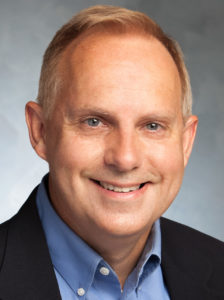It didn’t surprise me in recent weeks to read articles like the essay Gene Weingarten wrote for the Washington Post in which he lamented the fact that “I find myself profoundly disliking and disrespecting almost half of my countrymen and women.”
You know we live in a deeply divided nation, as do I, and we have been lamenting this for years. When I wrote Faithful Citizenship about the 2012 general election, I thought America was as divided across racial, political, cultural and religious lines as we had ever been. I labored even then to speak to my family and some of my childhood friends about issues in the news, about faith, about who I was and what I believed.

Greg Garrett
And here we are in 2020, and I’m reading Weingarten’s piece, and thinking about how every one of those divisions feels exponentially worse: the maelstrom of the first presidential debate, the clashes between Black Lives Matter marchers and white men bearing automatic weapons, the contrast between progressive and conservative Christian stances on President Trump, the simple fact that this morning while I stood in a store with clearly marked signs on the doors requiring masks for entry, an unmasked man got out of his truck, walked inside, looked over at me in my mask, and shook his head scornfully.
We look at each other across chasms that seem to widen day by day. We not only don’t seem to care about each other, but, as Weingarten (and Truck Guy in the store) suggest, we may actively dislike each other. This election, the pandemic and the social movement for racial justice — and its equally emotional opponents — have merely exposed how much distance there is between us. A priest friend of mine today seemed almost to have given up trying to reach those on the other shore: “I don’t want to talk to any of those people.”
I’ve seen lots of prescriptions for how to mend these divisions. Some of them are political and social; some are cultural. Certainly there are ways we more readily could draw together under a leader not determined to tear us apart. But as I mentioned in my last column, a great part of our division emerges from our tendency to make decisions from our political identities, which tend to be oppositional and adversarial, and not from our faith traditions, which at their best value love, compassion and responsibility. If we gauge our response to people based on their bumper stickers — and they do the same to us — I can understand my friend’s despair.
“A great part of our division emerges from our tendency to make decisions from our political identities … and not from our faith traditions.”
But, thanks be to God, there is a better way to approach those with whom we disagree, the better way of love and compassion. On the level of simple conversation, in a piece I wrote for Fox News, of all places, I summarized the things I’d learned from leading challenging public conversations (and from 30-plus years of teaching):
- Everyone has their reasons.
- We are more alike than we are different.
- Conversation is not about conversion.
Just in terms of how we relate to each other, it seemed to me to be essential to remember that people had not consciously chosen to disagree with me. They had come to their understandings of God, politics, culture and life through their own set of experiences, and like me, they were trying to figure things out the best that they could.
It was also important for me to remember how, in my own life — even in my own family — I had significant disagreements with people, yet I knew we all loved our kids and grandkids, loved our country and loved Jesus. Finally, it struck me that the models we have from cable news — or debate — are people shouting out, over and past each other. True conversation — respectful conversation — requires our listening, not just our attempt to impose our own will.
Political ways of looking at the world don’t typically encompass these insights. We’re encouraged to demonize those who disagree with us, deny their common humanity and assume the worst possible motives. This is bad for American democracy, certainly, but it is also simply bad Christianity.
Jesus knew that in any community — even a faith community — people would disagree with each other. Disappoint each other. Even hurt each other. For that reason, he devoted a lot of teaching time to how to deal with disagreements and divisions.
“Every avenue is to be explored before we cast someone away.”
In Matthew 18, a section of the Gospel scholars sometimes refer to as the Discourse on Life in the Faithful Community, he talks about how to approach someone who has offended you, about the importance of going in search of the one lost sheep, and he answers Peter’s question about how many times Peter must forgive someone by essentially telling him, “Over and over.” Every avenue is to be explored before we cast someone away. Matthew 18 teaches that, unlike in our political lives, Jesus thought it is more important to be in community than it is to be right, to love and to forgive than to despise and exclude.
Republicans and Democrats, pro-life and pro-choice, Green New Dealers and frackers, fans of the Cowboys and fans of the Washington Football Club: If we profess to be followers of Jesus, we take on the ministry of reconciliation (2 Corinthians 5:18) and are called to sacrificial love, compassion and forgiveness, not to partisan bickering, lasting rancor or petty abuses of power.
Mr. Lincoln looked out at a nation where Americans were also killing each other in the streets over their differences. Despite the violence, despite the disagreements, he concluded his Second Inaugural Address by appealing to the better angels of our nature: “With malice toward none, with charity for all, with firmness in the right as God gives us to see the right, let us strive on to finish the work we are in to bind up the nation’s wounds.”
This year, those wounds will require extra care, and we who follow Jesus are called to be the first responders.
Greg Garrett is professor of English at Baylor University, theologian in residence at the American Cathedral in Paris, and author of two dozen books, among them the new A Long, Long Way: Hollywood’s Unfinished Journey from Racism to Reconciliation.


